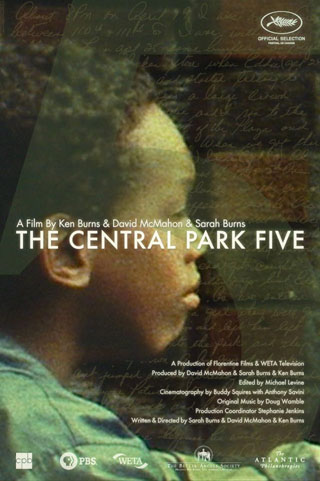Lawyers representing New York City have subpoenaed notes and outtakes from Ken Burns’s documentary The Central Park Five, reports Russ Buettner for the New York Times. Burns is not pleased, but before we get to that, a bit of background from Allan Tong, who wrote about the doc for Filmmaker when it screened in Toronto:
One April night in 1989, a woman was jogging through New York’s Central Park when she was beaten and savagely raped. She lost 75% of her bodily fluids, lay in a coma for days and her face was pulverized so badly that friends identified her by a ring on her finger. Police picked up five black and Latino teenagers, secured confessions and launched one of the ugliest trials in New York’s history. Newspaper pundits and Donald Trump called for the death penalty. Even the African-American community turned their backs on the teens. After all, they were savages.
Or were they? A sociopath would step forward a decade later and confess to the crime which led to the Central Park Five’s release in 2002. Based on his daughter Sarah’s book, this suspenseful documentary from Ken Burns, Sarah Burns and David McMahon tells the story of the Central Park Five, namely how police coerced confessions and persecutors convicted five innocent boys and stole their childhoods.
“While it’s critically important to the case, the footage of the confessions is largely there to continually remind the audience how young these guys were,” writes NPR’s Linda Holmes, “just kids, scooped up and convicted and gone. Contemporary interviews reveal men who were changed forever by the experience of being locked up as teenagers, and as fortunate as it is that the man whose DNA actually matched what was found on the victim (as theirs did not) eventually stepped forward and confessed, it doesn’t change the fact that it remains a profoundly sad story that deeply scarred these guys who spent years in prison for something even the Manhattan district attorney eventually concluded they didn’t do.”
“But The Central Park Five isn’t The Thin Blue Line (1988),” writes Jaime Pena for Cinema Scope, “and Burns, McMahon and Burns aren’t Errol Morris. Nor are they the cinematic equivalent of a law firm that succeeds in proving the innocence of their clients to us jury members in the audience. They are rather the effective and didactic reporters who denounce the role played by the media in the conviction. The five teenagers, Latino and African-Americans, were the perfect suspects. The film seems to be saying ‘Who else was going to be accused?'”
“There’s plenty of heartfelt testimony from kids about how cops mistreated them and how they survived long terms in prison,” notes David D’Arcy at Artinfo, “but we don’t hear from those who let the miscarriage of justice happen. This doc needs interviews with detectives and prosecutors, and with the reporters who never looked too hard at the evidence of ‘wilding’ that sent innocents to jail. Is the Ken Burns approach too nice? This doc needs a killer instinct.”
Writing for Twitch, Eric D. Snider finds The Central Park Five “serviceable and informative, but not particularly cinematic…. It’s more like an interesting, in-depth article in The New Yorker than a movie.” But at Ioncinema, Jordan M. Smith finds it “riveting” and “a poignant platform for discussion on the merits of taking shortcuts for what is considered ‘the greater good.'”
Back to Buettner: “Mr. Burns said the subpoena, dated Sept. 12, came after the city had spent years rebuffing requests for interviews that he felt would help best explain the actions taken by law enforcement officials involved in the prosecutions. ‘There is a great deal of disappointment that it came to this, given the fact that we had given so many of the factions in this complicated story many, many opportunities, on a regular basis, to comment,’ he said in an interview…. John Siegal, a lawyer representing the filmmakers, said the city’s demand for unpublished material requires the city to show how the material is necessary to its defense and unavailable elsewhere. ‘We don’t think they are going to be able to make that showing,’ Mr. Siegal said.”
Update, 10/5: Frank DiGiacomo, who was working at the New York Post when the case originally went to court, has been following the story at Movieline: “On one hand, [NYC attorney Celeste Koeleveld is] dismissing The Central Park Five as propaganda—and citing its alleged advocacy as the reason that city and law-enforcement officials did not sit before the filmmakers’ cameras. On the other, she’s claiming that the interviews conducted for the movie are crucial to the understanding of the case. So, which is it?” He’s also posted a letter from the filmmakers’ attorney to the City.
Toronto 2012: a guide to the coverage of the coverage. For news and tips throughout the day every day, follow @KeyframeDaily on Twitter and/or the RSS feed. Get Keyframe Daily in your inbox by signing in at fandor.com/daily.




